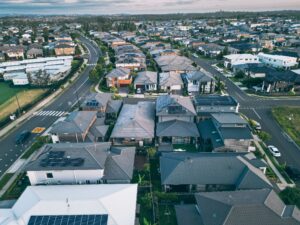Which Defence Stocks Will Benefit from Trump’s Defence Spending Boom from 2025 to 2028? Here are our 4 Picks!

Defence stocks could well be the biggest winners under the second Trump presidency. It is difficult to imagine the “peace through strength” philosophy that Donald Trump expressed during his first term would be different to the first. In such a case, 2025 could mark the beginning of significant government investment in the defence sector – potentially at the expense of other sectors.
During his first term, Trump allocated substantial money to modernise U.S. military forces, focusing on areas like missile defence, hypersonic weapons, and autonomous systems. His administration increased the defence budget to over $700 billion annually by 2020. A similar strategy is expected if Trump returns to office, as he has consistently championed strengthening military power to counter emerging global threats from certain nations.
Which Defence Stocks Will Perform Better Under Trump in 2025?
But not all defence stocks will directly benefit. Only some will, and they will be those stocks in areas that are direct recipients of US government funding.
Let’s think back to some of the defence sector expenditures during Trump’s first term. Some of the highest were missile defence, hypersonic weapons, and autonomous systems. The Trump administration raised the defence budget to more than $700 billion per year by his last full year in 2020. This pattern will most likely continue under a second term with Trump at the helm as he continues to advocate for increasing military capability due to the rise of global threats emanating from certain countries.
Top Picks for Defence Stocks
Austal (ASX: ASB)
Austal is an Australian defence contractor specialising in shipbuilding and vessel support services. The company is a major provider of advanced naval ships, including the LCS and EPF vessels, for the United States Navy. Austal operates in Australia, the United States, and the Philippines, making it one of the biggest players in the world’s maritime defence forces.
Austal has seen revenue of over A$1.6 billion since 2023, on the back of ongoing contracts with the United States Navy and the expansion into autonomous vessel technologies. This company continues to increase profitability through streamlined operations and its emphasis on low-cost production. As the world begins to invest in more defence funds, Australia is well-positioned to continue winning contracts due to modular and efficient ship designs.
With Trump’s emphasis on maritime security and strengthening the naval fleet, Australia is well-positioned to benefit. Its proven track record with the U.S. Navy and focus on innovation align with anticipated defence priorities.
DroneShield (ASX: DRO)
DroneShield is an Australian company in defence technology, specialising in counter-drone systems aimed at the detection, tracking, and neutralisation of unmanned aerial threats. It addresses the growing concern of drone-based threats by catering to the military, law enforcement, and the protection of critical infrastructure.
DronesShield ‘s Revenues in 2023 Exceeded A$60m – a huge increase in previous years and well-valued in the country, with key government contracts, including the U.S. Department of Defence, reinforcing reputation and financial security. Further investment in artificial intelligence along with advanced sensor technologies has kept the Drones Shield solution efficient and not outdated.
As unmanned aerial systems, or UASs, increasingly take part in modern warfare, Trump’s administration is likely to emphasize countering drone capabilities. DroneShield’s niche expertise combined with strategic partnerships with the global defence agencies makes it a strong candidate for growth.
Lockheed Martin (NYSE: LMT)
Turning to US stocks, Lockheed Martin is the largest defence contractor worldwide and a leader in new aircraft, missile systems, and space technology. Its flagship F-35 fighter jet program remains a cornerstone in global defence, with substantial international and domestic orders.
Lockheed Martin achieved a 14% net sales growth in its first quarter, which totalled $17.2 billion in 2024. The rise stemmed from the group’s robust Aeronautics segment, particularly its F-35 program. The company’s dividends are robust, indicating stability and a focus on shareholders.
Already under Trump, in terms of increasing America’s defence spending, Lockheed Martin is bound to be ahead of the chain due to its already existing contracts and advanced technologies. Additionally, having an extensive global footprint and diversified portfolio ensures resilience against the fluctuations of markets.
Northrop Grumman (NYSE: NOC)
Northrop Grumman has superior expertise in aerospace systems, cybersecurity and missile defence. It is a leading contractor in hypersonics as well as in space-based defence platforms and is thus well-placed to meet emerging military needs.
Northrop Grumman generated a net revenue of $36 billion in 2024 through growth in classified programs and missile systems. Its investment in next-generation technologies, including hypersonics and autonomous systems, has also improved its market share and long-term prospects.
Trump’s efforts in space defence and advanced military technologies truly resonate with Northrop Grumman’s key strengths. The company leads the field in sophisticated innovation with the capability to win classified contracts, suggesting it will outperform in the competitive environment.
Why These Stocks May Outperform Others
Austal, DroneShield, Lockheed Martin, and Northrop Grumman are the kinds of companies that Trump will want to strengthen the U.S. military. Austal manufactures for the U.S. Navy while DroneShield has specialized in counter-drone technologies. This is the kind of companies that have a history of good performance and they have never failed in securing government contracts.
Lockheed Martin and Northrop Grumman are seen as leaders in defence with long relationships with the Pentagon. Defence companies tend to go on even through recessions due to the underpinning nature of government defence spending. The said line is going to give them a better run compared to such sectors as technology or retail, which can easily be affected by market circumstances. International instability, like that from the Russia-Ukraine conflict or rising tensions within the Indo-Pacific, is driving up international demand for advanced defence systems.
Companies like Lockheed Martin and Austal have strong export markets so are not dependent on domestic policy exclusively. Trump’s economic policies generally support deregulation and tax cuts, sources of capital that could be available to these companies for R&D and expansion. During his administration, the increase in domestic manufacturing could further favour U.S.-based companies such as Northrop Grumman.
Should You Invest in Defence Stocks Now?
Defence stocks could be a good bet now, especially with global instability and growing geopolitical tensions that will raise demand for developed defence technologies. The sector is stable because of persistent government spending regardless of the economic cycle.
There is also the added anticipation that defence budgets should be growing further with an occasional policy shift such as one that might come with a Trump presidency in 2025. Coupled with the fundamental virtues of companies and market conditions, diversifying into this sector from there could be considered as mitigating possible risks involved.
Final Thoughts
Under the Trump administration, the defence sector is poised for substantial growth. Investors seeking exposure to this dynamic sector should consider these stocks for their innovation, strategic alignment, and financial performance. However, as with any investment, due diligence and awareness of sector risks remain essential.
What are the Best ASX Stocks to invest in right now?
Check our buy/sell tips

FAQs
- Why are defence stocks considered a stable investment?
Defence stocks tend to be stable due to consistent government spending on military and defense, even during economic downturns.
- What are the risks of investing in defence stocks?
Some of the risks include dependency on government contracts, regulatory changes, and potential cutbacks in defence spending by the government.
- Are defence stocks affected by political changes?
Yes, political shifts, such as changes in administration or defence policies, can significantly influence the sector.
- What factors drive the performance of defence stocks?
Geopolitical tensions, defence budgets, technological advancements, and government contracts play significant roles in determining the performance of defence stocks.
Blog Categories
Get Our Top 5 ASX Stocks for FY26
Recent Posts
Diversifying Portfolios with ASX Consumer Stocks: Opportunities and Risks
The ASX 200 has delivered significant volatility recently, and market participants observing the screens in 2025 understand the turbulence firsthand.…
Is Lendlease (ASX:LLC) out of the doldrums for good?
Lendlease (ASX:LLC) has for the past several years been the classic definition of a ‘value trap’. You think a good…
Here are the 2 most important stock market taxes that investors need to be aware on
As one of two certainties in life, investors need to be aware of stock market taxes. Investors may be liable…


